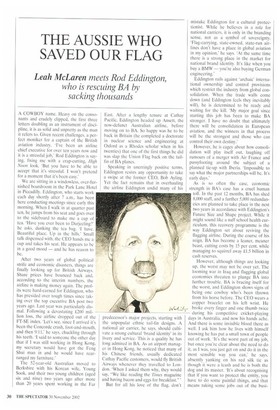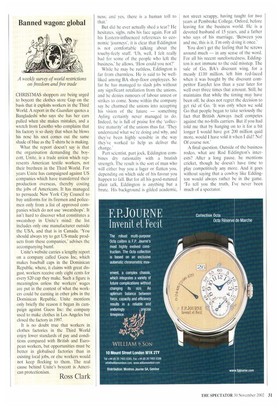THE AUSSIE WHO SAVED OUR FLAG
Leah McLaren meets Rod Eddington,
who is rescuing BA by sacking thousands
A COWBOY name. Heavy on the consonants and crudely clipped, the first three letters doubling as an instrument of discipline, it is as solid and unpretty as the man it refers to. Given recent challenges, a perfect moniker for a captain of the British aviation industry. 'I've been an airline chief executive for over ten years now and it is a stressful job,' Rod Eddington is saying, fixing me with a crap-cutting, High Noon look. 'But you have to be able to accept that it's stressful. I won't pretend for a moment that it's been easy.'
We are sitting in a windowless, over-furnished boardroom in the Park Lane Hotel in Piccadilly. Eddington, who starts work each day shortly after 7 a.m., has been here conducting meetings since early this morning. When I walk in at quarter past ten, he jumps from his seat and goes over to the sideboard to make me a cup of tea. 'Have you ever been to Darjeeling?' he asks, dunking the tea bag. 'I have. Beautiful place. Up in the hills.' Small talk dispensed with, the CEO hands me a cup and takes his seat. He appears to be in a good mood — and he has reason to be.
After two years of global political strife and economic disasters, things are finally looking up for British Airways. Share prices have bounced back and, according to the interim numbers, the airline is making money again. The profits were hard-earned for Eddington, who has presided over tough times since taking over the top executive BA post two years ago. Last year was particularly dismal. Following a devastating £200 million loss, the airline dropped out of the FT-SE index. 'Let's see, since I arrived it's been the Concorde crash, foot-and-mouth, and then 9/11.' he says, chuckling through his teeth. 'I said to someone the other day that if I was still working in Hong Kong, my secretary would have got the Feng Shui man in and he would have rearranged my furniture.'
The 52-year-old Australian moved to Berkshire with his Korean wife, Young Sook, and their two young children (aged six and nine) two years ago after more than 20 years spent working in the Far East. After a lengthy tenure at Cathay Pacific, Eddington headed up Ansett, the now-defunct Australian airline, before moving on to BA. So happy was he to be back in Britain (he completed a doctorate in nuclear science and engineering at Oxford as a Rhodes scholar when in his twenties) that one of the first things he did was slap the Union Flag back on the tailfin of BA planes.
Speaking in unerringly positive terms, Eddington resists any opportunity to take a swipe at the former CEO, Bob Ayling. Yet the fact remains that in overhauling the airline Eddington undid many of his
predecessor's major projects, starting with the unpopular ethnic tail-fin designs. A national air carrier, he says, should cultivate a strong cultural 'brand identity' in its livery and service. This is a quality he has long admired in BA. As an airport manager in Hong Kong, he noticed that many of his Chinese friends, usually dedicated Cathay Pacific customers, would fly British Airways whenever they travelled to London. 'When I asked them why, they would say, "We like reading the Times magazine and having bacon and eggs for breakfast."'
But for all his love of the flag, don't mistake Eddington for a cultural protectionist. While he believes in a role for national carriers, it is only in the branding sense, not as a symbol of sovereignty. 'Flag-carrying, state-owned, state-run airlines don't have a place in global aviation in my opinion,' he says. 'At the same time there is a strong place in the market for national brand identity. It's like when you buy a BMW — you're also buying German engineering.'
Eddington rails against 'archaic' international ownership and control provisions which restrict the industry from global consolidation. When the trade walls come down (and Eddington feels they inevitably will), he is determined to be ready and waiting for the kill. 'My major goal since starting this job has been to make BA stronger. I have no doubt that ultimately there will be consolidation in European aviation, and the winners in that process will be the strongest and those who can control their own destiny.'
However, he is cagey about how consolidation will play itself out, laughing off rumours of a merger with Air France and pussyfooting around the subject of a planned tie-up with Iberia. 'Impossible to say what the major partnerships will be. It's early days.'
As is so often the case, economic strength in BA's case has a cruel human toll. In the past 12 months, BA has shed 8,000 staff, and a further 5,000 redundan cies are planned to take place in the next two years in accordance with Eddington's Future Size and Shape project. While it might sound like a naff school health curriculum, this recovery programme is the way Eddington set about reviving the flagging airline. During the course of his reign. BA has become a leaner, meaner beast, cutting costs by 15 per cent, while managing to squirrel away £1.5 billion in cash reserves.
However, although things are looking up. the worst may not be over yet. The looming war in Iraq and flagging global economies threaten to plunge BA into further trouble. BA is bracing itself for the worst, and Eddington shows signs of being one cowboy who's been thrown from his horse before. The CEO wears a copper bracelet on his left wrist. He broke every finger and one thumb twice
during his competitive cricket-playing days in Australia, and now his hands ache. And there is some invisible blood there as well. I ask him how he lives with himself knowing he has put a small town of people out of work. 'It's the worst part of my job, but once you're clear about the need to do it, as I was, you just get on and do it in the most sensible way you can,' he says, absently yanking on his red silk tie as though it were a leash and he is both the dog and its master. 'It's about recognising that if you want to protect the entity, you have to do some painful things, and that means taking some jobs out of the busi
ness: and yes, there is a human toll to that.'
But did he ever actually shed a tear? He hesitates, sighs, rubs his face again. For all his Eastern-influenced references to economic 'journeys', it is clear that Eddington is not comfortable talking about the touchy-feely stuff. `Uh, well, I felt really bad for some of the people who left the business,' he allows. 'How could you not?'
While he may be ruthless, Eddington is far from charmless. He is said to be wellliked among BA shop-floor employees. So far he has managed to slash jobs without any significant retaliation from the unions, and he denies rumours of labour unrest or strikes to come. Some within the company say he charmed the unions into accepting his vision of the future — something Ayling certainly never managed to do. Indeed, he is full of praise for the 'collective maturity' of the unions thus far. 'They understand what we're doing and why, and they've been highly sensible in the way they've worked to help us deliver the change.'
Part scientist, part jock, Eddington combines dry rationality with a brutish strength. The result is the sort of man who will either buy you a lager or flatten you, depending on which side of his favour you happen to fall. But for all his good-natured plain talk, Eddington is anything but a brute. His background is gilded academic, not street scrappy, having taught for two years at Pembroke College, Oxford, before leaving for the business world. He is a devoted husband of 15 years, and a father who says of his marriage, 'Between you and me, this is it. I'm only doing it once,' You don't get the feeling that he screws around much — in any sense of the word. For all his recent surefootedness, Eddington is not immune to the odd misstep. The sale of Go, BA's discount wing, for a measly £110 million, left him red-faced when it was bought by the discount competitor EasyJet less than a year later for well over three times that amount. Still, he maintains that while the timing may have been off, he does not regret the decision to get rid of Go. 'It was only when we sold Go that people began to take seriously the fact that British Airways ttself competes against the no-frills carriers But if you had told me that by hanging on to it for a bit longer I would have got 200 million quid more, would I have sold it when I did? No! Of course not.'
A final question. Outside of the business rodeo. what are Rod Eddington's interests? After a long pause, he mentions cricket, though he doesn't have time to play competitively any more. And it goes without saying that a cowboy like Eddington would always rather be in the game. 'To tell you the truth, I've never been much of a spectator.'



























































































 Previous page
Previous page